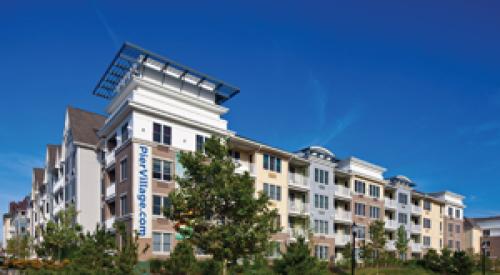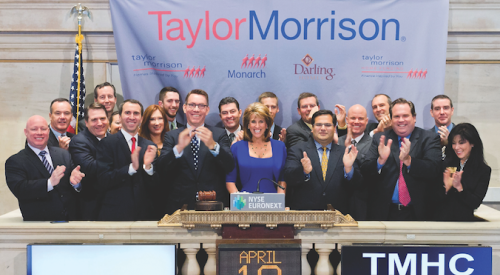|
 |
Lerner's Chicago-based firm, MCZ Development, caught our attention when it rose like a rocket in the last two Giant 400 rankings. In the 2004 Giants Report, published in April of that year, MCZ showed up at No.58, up from No.197 the previous year. Revenues advanced from $91 million in 2002 (on 255 closings) to $340.5 million in 2003 (on 1200 closings). In the 2005 rankings, published last April, MCZ kept right on trucking — up to No.21 on 2004 revenues of $1.26 billion (on 4361 closings).
So there sits MCZ, a relative unknown — right between long-established heavyweights Morrison Homes and Brookfield Homes —solidly entrenched in the $1 billion-plus revenue club we refer to as "Masters of the Universe." And remember, this is a niche builder — specializing in high-density, infill projects, much of its production in adaptive re-use urban lofts and new high-rise condo buildings. MCZ is also spreading out geographically, using its city housing successes in Chicago to move into Kansas City, South Florida, Orlando and Boston.
Roadmap To Housing's Future?There's something happening here. MCZ's success just might offer an intriguing glimpse into the future of ownership housing in America. The big public builders see it. That's why all of them are scrambling to add infill, high-density — and yes, even high-rise — projects to their product mix.
So we went to see Michael Lerner at the MCZ headquarters in Chicago's Loop, to find out what makes him tick and what his plans are for MCZ in the coming years.
 |
"We got our start in adaptive re-use, here in Chicago, in the late 1980s and early 1990s — just as the urban redevelopment movement across the country was beginning to take shape," Lerner says today. "That's when it first became evident there were people who really wanted to come back into the city to live...people with money...empty nesters as well as young singles.
"Randolph Place was a breakthrough project for us. It was a million square feet of downtown retail and office space, with 341 condo units in a mixed-use development at Canal and Lake Streets in Chicago. We developed it between 1998 and 2000. At that time, it was the biggest adaptive re-use project in this country. We got a lot of mileage out of it, a lot of national recognition at a time when municipalities all around the country were beginning to look at their downtowns with an eye toward meeting the new demand for city living. We even had families, with kids in school, move into Randolph Place."
The latest generation of such product is No. Ten Lofts, a 265-unit adaptive re-use project now under construction in Chicago's burgeoning West Loop. The three-building courtyard loft project includes re-use of a six-story, timber-beamed building. The pre-sold mix of studios, one- and two-bedroom condo units range from 640 to 1915 square feet, priced from $235,900 to $454,900, all with indoor parking.
Lerner deflects any suggestion that he is the Donald Trump of downtown housing, pointing out that MCZ's recent growth has been greatly aided by a close joint venture relationship with Centrum Properties, a Chicago mixed-use development Giant headed by Arthur Slaven and John McLinden. "We're not Donald Trumps," Lerner laughs. "Most of our success comes from the good markets we're in, not from any genius on our part. We go where the buyers are, and where the cities are not just cooperative, but supportive of what we do. Urban housing requires political support or it doesn't happen."
Of his relationship with Slaven and McLinden, Lerner says, "We've been friends for a long time. We started doing projects together here in Chicago three years ago. We made the decision to go to Florida together. I still do a lot of general contracting work that they're not part of, and they have a big commercial development division that we're not part of — but we now do all of our residential development in joint ventures with Centrum. We still have a couple of independent projects we started here in Chicago before three years ago. But we've found working together to be very advantageous.
"We have to travel to every site we're offered. We never do a land buy without walking the site. Now we've got three principals to look at deals. That helps."
 |
When asked to define how his business differs from those that surround MCZ in the Giants rankings, Lerner says there's precious little uniformity in his, compared to what he perceives to be the mass uniformity of suburban single-family home building at four units to the acre: "We look at the potential to create residential enclaves in areas that would not strike anyone else as land for housing," he says. "That's very different from looking for suburban land, as a commodity, to feed to a home building machine.
"If we want to be near downtown, we go look at the land that surrounds it. We don't find much vacant land, so we look at what might work for us in one way or another. It might involve converting a couple of existing buildings, then building a new tower right in the middle of what's there now. It's a very creative process — all based on location in relation to the attractions that have the potential to add value, like downtown or the ocean."
 |
Townhouses and detached homes are sometimes a small part of MCZ projects, but most of what the firm does is at much higher densities. "Most everything is condominium ownership," says Lerner, "and a lot of it is very innovative. For instance, in Florida, we are now into condo hotel development in a big way. That's a new form of development that's revolutionizing the hotel business in resort locations, especially all over Florida. Virtually every new hotel under construction there is a condo hotel."
 |
"There's so much demand for beachfront living in Florida," Lerner says, "but the land prices on the ocean make it hard for us to sell second homes at prices people can afford. This is an innovation that allows us to do that, and it's also getting new hotels built that would never happen any other way.
"We're doing a major condo hotel project in Miami Beach right now."
Where Risk ResidesWhile MCZ's high-rise condos are usually 80 percent pre-sold before construction begins, they are not closed until they are completed — and that creates an element of risk that many single-family home builders would find uncomfortable. High-rises take two years or more to build, and markets can change in two years. "We face the same issues of over-building that have plagued rental apartment builders for decades," Lerner admits. "That's why we're not building in the city of Miami right now. For two years, we've been looking at what's coming out of the ground and what's planned — so we've passed on every deal that's come our way.
"Plenty of guys have done successful projects in downtown Miami since we started passing on opportunities. They've sold them out and started construction. There are no rules for managing risk in our business. It's more of an art than a science."
Another risk factor is that a large percentage of MCZ's buyers are investors, with minimal interest in actually living in the condo units they buy. "I've seen reports that 70 percent of condo buyers in Miami are investors," Lerner says. "It's not as big an issue for us because we're not going to be there selling units for three years, as a subdivision builder might be. We don't allow people to flip contracts. They have to close with us before they can sell, so we never end up competing against our own product for sales."
New MarketsMCZ should approach $2 billion in revenue in 2006, Lerner says, with Florida projects producing the bulk of that revenue, but the firm has plans to move into several new markets. "We're trying to buy a lot of land in Arizona as well as Florida. We're in Washington, D.C., and on the Atlantic coast of Georgia. Our major focus is on Florida because that's a long-term growth market," Lerner says. "We just did three deals this week. The Florida market is still strong. When it slows down, we'll know it.
"We're not going to try to time the market. There's nobody that can tell you how long this will last. What may cause a problem for us in Florida is that construction costs may go through the roof because of what Hurricane Katrina did to the Gulf Coast. Materials and labor costs could be a big problem in both Texas and Florida.
"If something comes to us in Minneapolis or Milwaukee, we'll take a look. If it's a deal the city is committed to, that will create an attractive urban living environment, we might take it as a one-time deal. But in cities like that, you're not tapping a market beyond the suburbs of the local community. In Florida and Arizona, the right project can draw buyers from all over the world. Las Vegas is that kind of market, but we missed on Vegas and now it looks like it has the potential for over-building," Lerner reasons. "California has some great urban housing markets, but it's just too far away for us. The time difference is a hindrance to doing business. Getting out there and back is just tough."
An Acquisition Target?MCZ's rapid rise up the Giants rankings, in combination with many big builders' newfound interest in high-density condo development, would seem to make this firm an attractive target for acquisition. But Lerner rejects the idea: "We've had a few phone calls," he admits, "but I'm not sure anyone would want to buy us. Public builders would certainly have difficulty getting their arms around what we do. They'd think we're cowboys...
"We're very entrepreneurial. We move fast. We buy troubled projects and troubled land. Conventional home builders would have a tough time understanding it. Sometimes I do, too," Lerner says.
"We're more likely to be a buyer than to sell."
| |||||||||||||||||||||||||||||||||||












